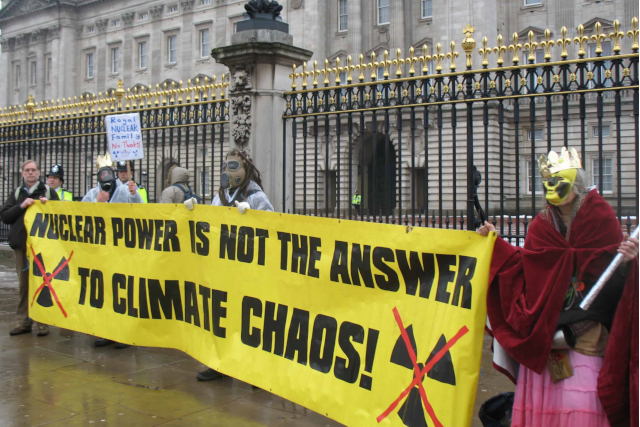Just Stop Nuclear, No to Nuclear, Go Fishing, Not Fission, and more. Since the Cold War people have struggled to separate the existential terror of nuclear bombs from the incredible energetic promise of nuclear power reactors. Anti-nuclear was synonymous with anti-war, and who wasn’t anti-war during the 70s? While fear of nuclear war may have initially propelled the anti-nuclear movement, health concerns, renewable favoritism, and big oil & gas interests supplied plenty of momentum.
Each of these concerns have their own merit. We’ll quickly tackle health concerns, fossil fuel interests, and the conflation of nuclear energy with nuclear war, before moving onto the pressing questions: why do advocates for renewable energy dislike nuclear?
While health concerns surrounding waste and radiation seem reasonable on the surface, decades of research and empirical evidence has cemented nuclear power as one of the safest forms of energy. The extensive Wikipedia list of nuclear and radiation deaths lists 35 direct deaths and estimates ~5,000 due cancer from radiation since 1957. Chart 1 shows a comparable death rate from accidents and air pollution among nuclear power, wind, and solar. It is generally understood among the scientific community that people are exposed to radiation all the time in their daily lives, with widely accepted cosmetic and medical treatments being two of the more common.
An extension of health concerns is fear of nuclear war. The idea goes that an expansion of nuclear power will lead to more enriched uranium floating around, making it easier for nuclear bombs to fall into the ‘wrong’ hands. The error articles such as this one make is suggesting we can put technology back in a box and forget about it. Yes, knowing how to enrich uranium for a nuclear power plant helps one figure out how to make a bomb. However, this information is fairly accessible at this point, with 7 countries having exported nuclear reactors, and 20+ being ‘armed’ with nuclear weapons. The cat is out of the bag. We didn’t try and do away with planes after 9/11, or oil after it fueled WW2. At this point diplomacy and defense systems are the best way to prevent nuclear war- not futile attempts at suppressing the technology.

Health concerns surrounding nuclear power radiation and war (though incorrect) are understandable, as is big oil & gas opposition. These energy giants have no desire to see their monopoly on energy markets overturned. When nuclear power becomes the dominant energy source, these companies will becomes obsolete- much the way wood as an energy source has.
It is easy to understand nuclear power fears of the uneducated and incumbent fossil fuel industry, but why are so many environmentalist unshakably opposed to nuclear power?
As I suggested earlier, much of the environmental movement grew out of the protest era 1960s. People were fighting for racial equality and global peace. After the Vietnam War ended in 1975 and racial integration was being enforced across the country, millions of activists were left without a clear cause. The Cold War nuclear arsenal stockpiling was in full force and fear of war between the USSR and USA were near all time highs- what better cause to take up than anti-nuclear?
Understandable as this is during the peak of the Cold War, activist opposition to nuclear after the dissolution of the USSR becomes harder to explain. At some point the primary fear of ‘nuclear’ went from war to energy, and this is where we lost the plot.
Simultaneously, a movement started around global warming and climate change. Activists argue(d) the earth was and is desperately close to destabilizing due to human caused green house gas emissions. As we all do, these people envisioned the ideal future- one where all of our energy was supplied by renewable sources- solar, wind, water, the earth. Nuclear power was still associated with the cold war and nuclear weapons, but most importantly, seen as a distraction from the ideal scenario these activists held in their collective vision.
Thus, as the political activists of the 70s shifted their focus from war to climate change, nuclear power suffered from nuclear was association and being a distraction from renewables. The environmentalist mecca of a world powered by solar, wind, hydro, and geothermal has no room for nuclear. Given the pursuit of ideals inherent in the nature of collective activism, there is little room for nuance. Arguments that are logical to outsiders fall on deaf ears; the idea that not including nuclear in the future energy mix meant heavier reliance on worse energy sources such as coal, oil, and gas was seen as silly. The idealists don’t want compromises- don’t negotiate with terrorists, right?
A future does exist where we have amazing batteries to store excess solar and wind power to be used during peak demand, low output, times. We don’t have that now, though, and we do have more information on the safety and viability of nuclear, solar, wind, hydro, and geothermal. As I write in the piece, ‘compare nuclear, wind, solar, geothermal‘, we now realize building wind and solar farms requires a whole lot of not environmentally friendly materials and land use, with a long payback period. The science and real world experience of the last 30 years has clearly shown nuclear power has a place in fighting climate change.
Yet, the anti-nuclear climate change warriors still persist. They’re only human, and it is tough to admit when you’re wrong, especially if you’ve fought so hard and passionately for so long, as many of these people have. New perspectives are also hard to give the light of day when you are surrounded by group think, which is inherently part of large movements. Finally, many of these people still hold onto the ideal of a fully renewable power grid and disproven nuclear health & safety fears.
Hopefully this has helped you understand why activists so concerned with climate change are opposed to nuclear. Overtime tactful conversations with these environmentalists that highlight:
- Safety and cleanliness of nuclear power (as backed up by science)
- Necessity of moving away from fossil fuels
- Ways in which nuclear power and renewables compliment each other
- Need for more energy globally
- Futility of suppressing technology
Will lead to a nuclear renaissance that means a better future for our planet.




